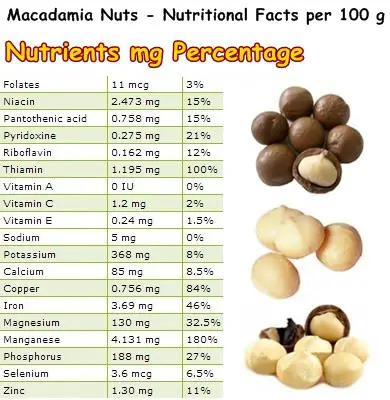Macadamia nuts are a popular food choice worldwide. Although native to the Australian continent, the species thrives in any region with a subtropical climate. Two major species of macadamia nuts are commercialized for human consumption: Macadamia integrifolia and Macademia tetraphylla. What makes then different from other nut varieties is their extremely high fat content, 75.8 g of fat for every 100 g and high energetic value of 740 kcal per 100 g. As such, they are best eaten in moderation, as part of an overall balanced and varied diet because they can easily cause weight gain.
But why are macadamia nuts so popular? The reason is simple: 100 g of raw kernels concentrate extremely high amounts of essential vitamins and minerals, of the likes of quality multivitamins, as well as healthy monounsaturated fats. Macadamia nuts are particularly rich in manganese, copper, magnesium, iron, vitamin B1 and vitamin B6 and boast antioxidant, anti-inflammatory and anti-aging properties as well as benefits for brain and nervous system health, immune and digestive systems, heart and muscles.

What do macadamia nuts look like?
Depending on the variety, macadamia nuts can have either a smooth shell (Macadamia integrifolia) or a rough shell (Macadamia tetraphylla). They closely resemble walnuts, having a brown, woody, hard shell and a bright green husk that easily falls off when the fruit is ripe. However, in the case of macadamia nuts, the green husk is pointy, while the kernel is a perfectly round, milky-white nut.
What do macadamia nuts taste like?
The sweet, nutty, fatty flavor of fresh macadamia nuts can have a truly magnetic appeal. The nuts can be cracked open and eaten as they are or added to cookie dough, pancake fillings and even sundae toppings. Their high fat content makes them ideal for cooking. But most important, macadamia nuts are highly nutritious and moderate consumption can help prevent a series of vitamin and mineral deficiencies and their side effects.
Side effects and contraindications
In order to enjoy all the health benefits macadamia nus have to offer, it’s best to only eat raw, unsalted nuts and, of course, keep to a moderate intake. Salted nuts and seeds up sodium intake and can lead to high blood pressure over time. Because macadamia nuts have a bewildering 740 kcal/100 g, which is a high caloric value, even for nuts and seeds, they will cause weight gain which is conducive to poor cardiovascular health and metabolic disease.
Not to mention the biggest part of their energetic value is owed to a high fat content (75.8 g of fat/100g). In order to keep your daily calorie intake within healthy limits, remember that macadamia nuts are best consumed with moderation, infrequently or at least not every single day.

What are macadamia nuts good for?
Eating too much can cause weight gain and create a predisposition for other health problems. Because of their high calorie and fat content, macadamia nuts are not good for diabetics or anyone suffering from obesity, cardiovascular disease, especially high blood cholesterol levels and high blood pressure. The fat profile includes: 12 g of saturated fats, 59 g of monounsaturated fats and 1.5 g of polyunsaturated fats. However, if intake is limited, they are a genuinely healthy snack, considering their high nutritional content.
Macadamia nuts are a rich source of healthy monounsaturated fats, essential fatty acids that can help lower LDL (bad) cholesterol levels in the blood and thus protect against cardiovascular disease. Essential fatty acids also nourish the brain and support cognitive functions, which is why our diet needs to provide sufficient amounts to maintain intellectual effort. Macadamia nuts and other nuts and seeds are ideal for supporting learning and memory and improving brain fog for clearer thinking.
Adding to their health benefits, they boast an incredibly high fiber content: 8,6 g of fiber per 100 g of raw kernels. Modern diets tend to be low in fiber due to a decrease in the consumption of nuts, seeds, fruits, vegetables and cereals. As a consequence, modern man consumes low-fiber processed foods which slow down intestinal transit time and decrease the frequency of bowel movements. This, in time, may lead to chronic constipation. A small serving of macadamia nuts or any other fiber-rich nuts and seeds can help regulate bowel movements and relieve constipation naturally, with further benefits for hemorrhoid disease.
Fiber is further important for digestion and contributes to weight management. Although the high fat content of macadamia nuts might annul the weight loss benefits of the fiber. Macadamia nuts are high in protein as well, providing 7.9 g of protein per 100 g of kernels. The amino acids that make up protein support brain function and help synthesize neurotransmitters that regulate mood. In other words, eating macadamia nuts is good for brain fog and mood swings.

Macadamia nuts are a wonderful source of B vitamins: folic acid (11 mcg), niacin (2.473 mg), pantothenic acid (0.758 mg), pyridoxine (0.275 mg), riboflavin (0.162 mg) and thiamine (1.195 mg). B vitamins make sure the food we ingest is properly converted into energy which keeps us up and about all day long. Thiamine in particular is found in more than generous amounts in the kernels: 100 g of fresh kernels contains almost the entire recommended daily intake of the vitamin. The vitamin supports normal brain function and reduces the risk of premature cognitive decline. A regular consumption of macadamia nuts thus has important benefits for the nervous system.
In addition to this, the kernels are rich in minerals such as copper (0.756 mg), iron (3.69 mg), magnesium (130 mg), manganese (4.131 mg), phosphorus (188 mg), selenium, potassium, calcium and zinc. If you look at the numbers, you will notice that the amounts of minerals for only 100 g of raw kernels are indeed higher than the amounts found in many mineral supplements.
Copper, for instance, helps prevent premature hair graying. Iron combats anemia and fatigue, helps make new red blood cells and prevent neural tube defects in newborns. Magnesium increases calcium absorption in bones and supports muscle health. Manganese protects against oxidation produced by free radicals due to its antioxidant properties. Zinc supports the immune system, while phosphorus contributes to bone health. Imagine eating a handful of macadamia nuts and enjoying all of these health benefits thanks to the wide variety of vitamins and minerals found in them.
Do macadamia nuts have gluten?
Macadamia nuts are gluten-free. If you are struggling with the restrictions imposed by a celiac disease diet, you can safely eat macadamia nuts or flour and easily increase your nutrient intake to prevent possible vitamin and mineral deficiencies, without getting any gluten. Moreover, the kernels have a sweet, nutty flavor which will make it easier for children to enjoy them as well. The high amounts of monounsaturated fatty acids will also provide protection against cardiovascular disease and stroke. The only restrictions are that you limit intake and make sure you are not allergic to macadamia nuts.
